
The past week has proven to be something of a resurgence for Occupy Wall Street with two major protests featuring thousands of activists unfolding in states across the country.
In New York, demonstrators went on a #F29 “Shut Down the Corporations” tour of various corporate targets around the city, including Chase bank, Bank of America, and culminating with about 200 protesters rallying outside the Pfizer world headquarters.
Protesters gather outside Pfizer (All photos by Allison Kilkenny)
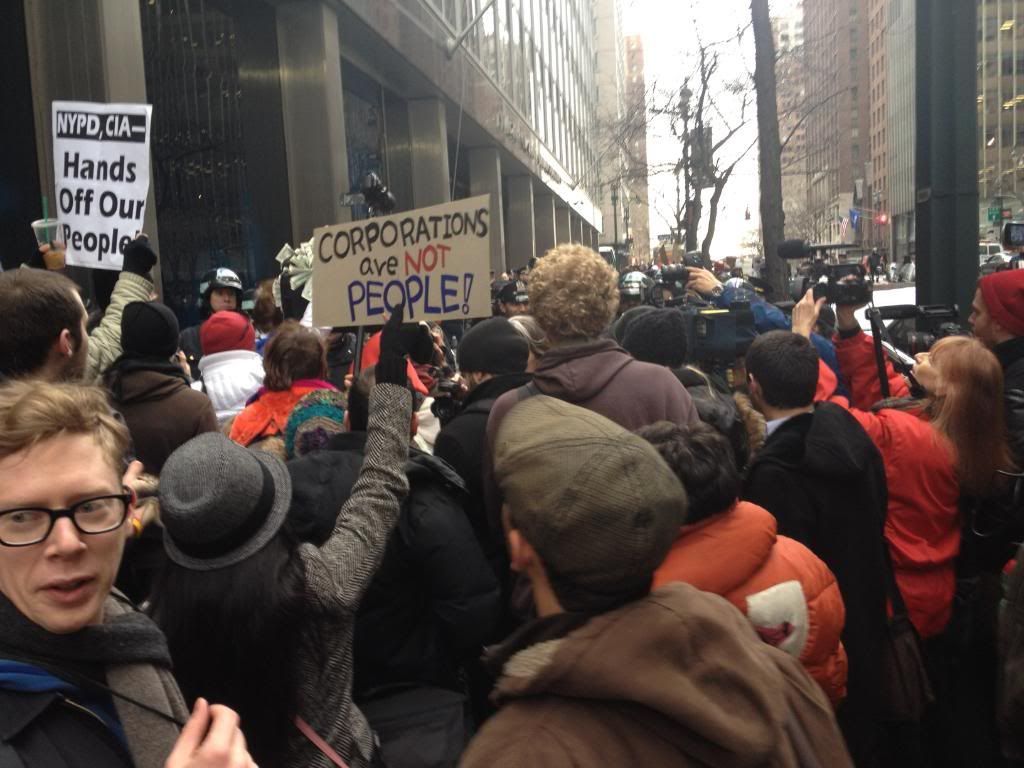
“Pfizer is a company that makes lifesaving drugs for five cents and resells them for fifty fucking dollars!” a young man declared via the People’s Mic as the crowd gathered outside the building.
About 10 demonstrators were arrested during the protest.
Police blocking Pfizer entrance
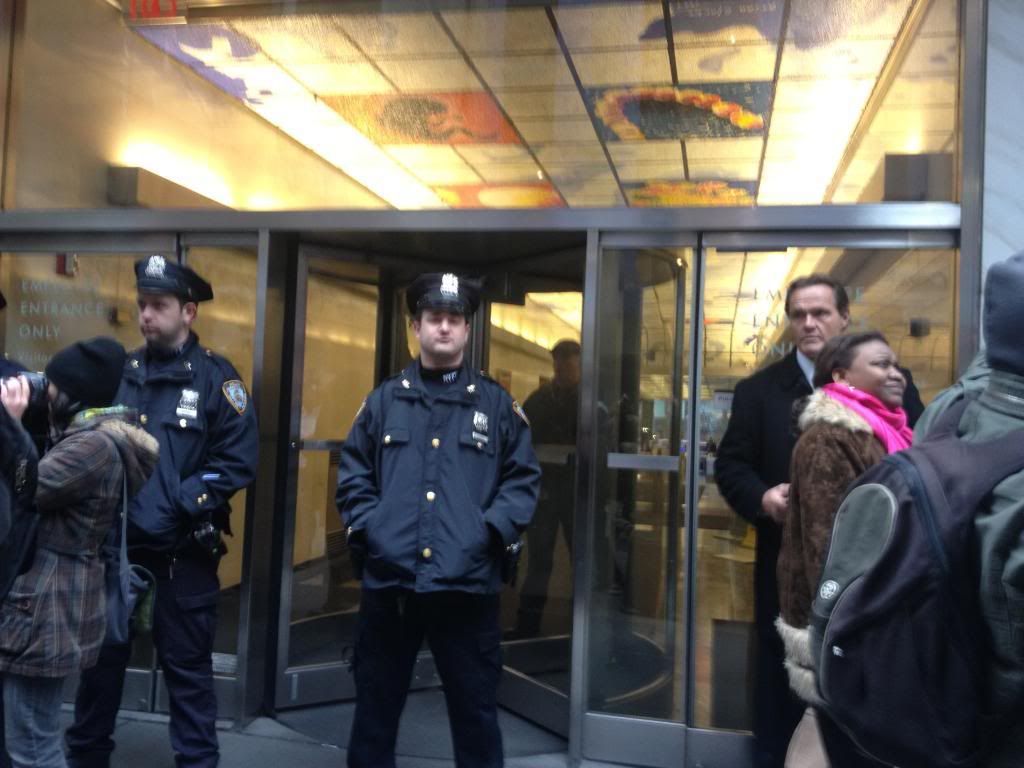
The original call to shut down corporations aligned with the American Legislative Exchange Council (ALEC) came from Occupy Portland. ALEC, the lobbying front group for some of the largest corporations in the world, is responsible for many of the anti-worker pieces of legislation introduced at the state level.
“I’m just here to say that ALEC can’t get away with drafting anti-worker and pro-corporate laws that are at the expense of the working class,” said Mark, an Occupy protester.
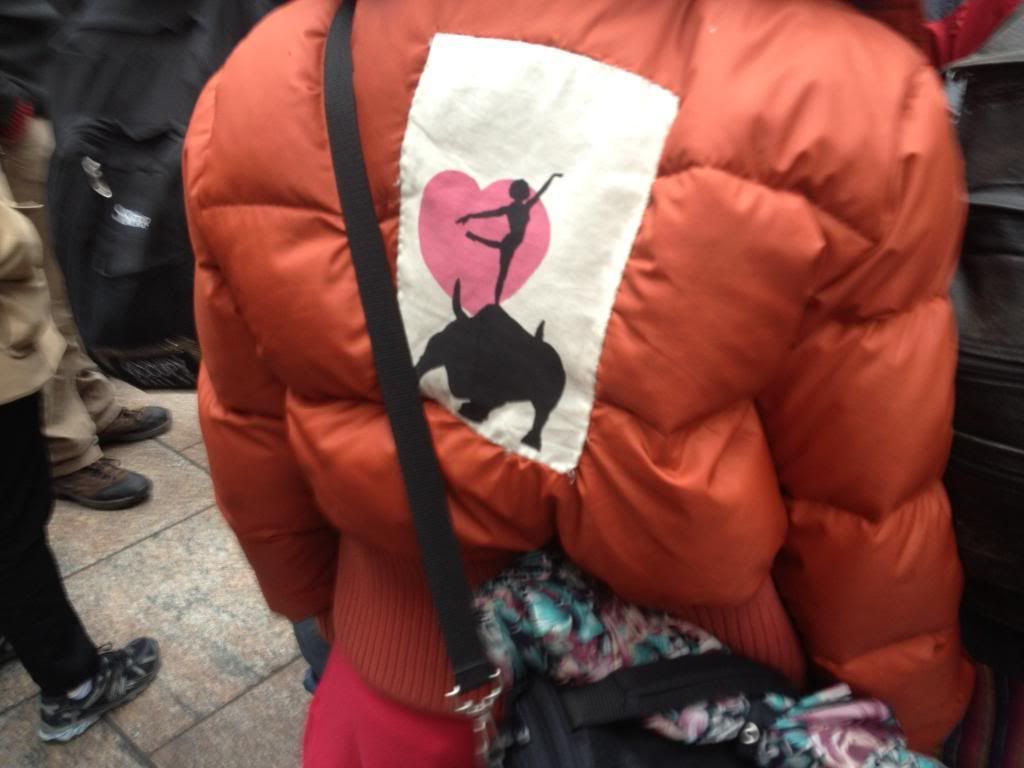 I previously wrote about ALEC’s wide-reaching influence and Koch brother ties, including ALEC itself bragging that at least 13 other states have passed resolutions based on their model language.
I previously wrote about ALEC’s wide-reaching influence and Koch brother ties, including ALEC itself bragging that at least 13 other states have passed resolutions based on their model language.
Mark, a representative from the Occupy Wall Street press team, believes one of the main jobs of Occupy Wall Street is educating the public about the relationship between corporations and government.
“When the call was put out by Occupy Portland to have this day specifically about ALEC, we thought it was really important to jump on because this is a specific instance where corporations are working with politicians to draft model legislation that ends up frequently in our state houses around the country and serves the interests of corporations over people.”
Wednesday’s protest included teach-ins at Bryant Park, and Rolling Stone’s Matt Taibbi taught the Bank of America class. During the lecture, Taibbi compared Bank of America selling bad mortgages to a dealer selling oregano as weed.
Noting that BoA’s share prices dropped to $5 last December, Taibbi stressed that if protesters pulled their money from the bank and prices dipped for more than a month, the bank would be “kaput.”
Taibbi speaks to protesters at Bryant Park
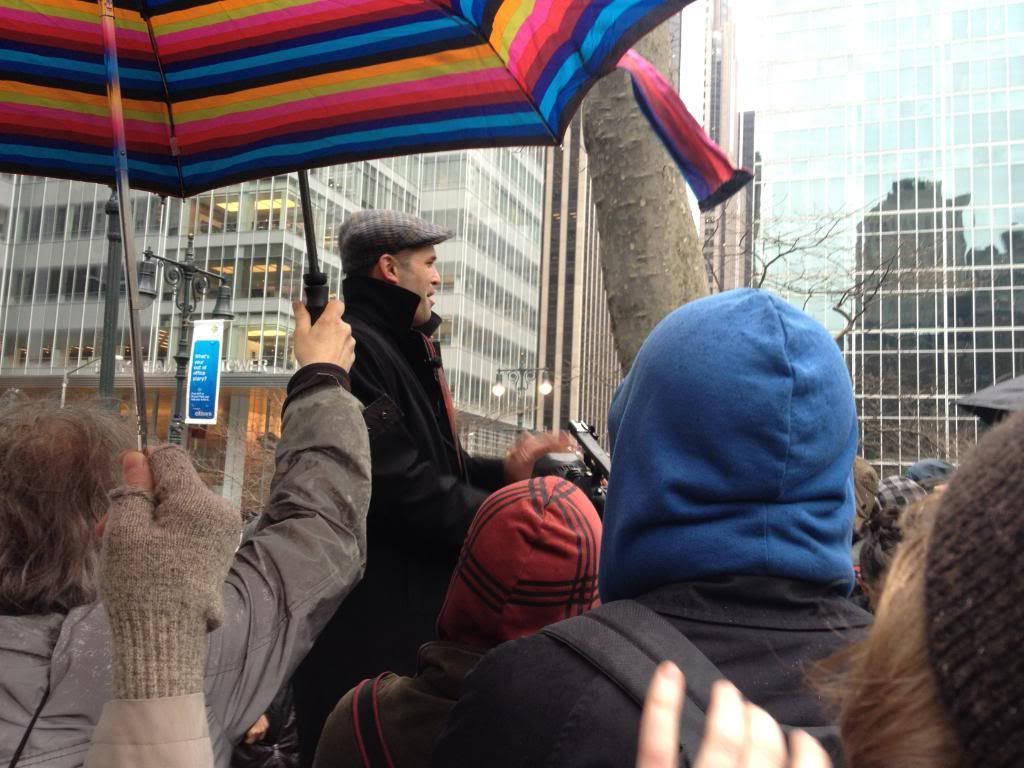
If the bank collapsed, BoA would have to be broken up into smaller operations that theoretically could be monitored and regulated much more easily, according to Taibbi.
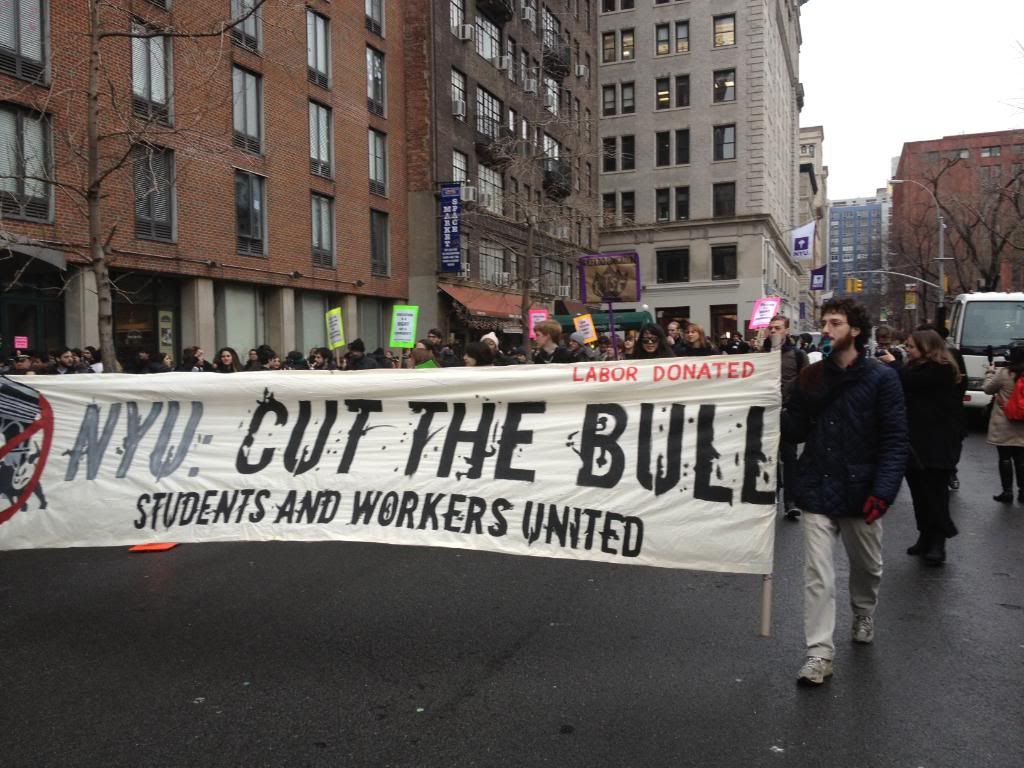 “We have to figure out how to unwind these corrupt companies,” he said, adding that he encourages everyone to move their money from BoA as it’s “not safe” to entrust their life-savings with a bank that has trillions of rotten derivative obligations on its books from the Merrill Lynch acquisition.
“We have to figure out how to unwind these corrupt companies,” he said, adding that he encourages everyone to move their money from BoA as it’s “not safe” to entrust their life-savings with a bank that has trillions of rotten derivative obligations on its books from the Merrill Lynch acquisition.
Taibbi also had tough words when it came to Attorney General Eric Schneiderman, who has been largely focusing on the illegal practices of banks.
“If no one goes to jail, he’s a fake and a fraud,” Taibbi stated.
Protesters at the #F29 event remain optimistic about the spring despite the inclement weather (low temperatures and near-constant rain) that at times threatened to extinguish the enthusiasm of the activists.
“Pretty much all the occupations are using the term ‘American Spring’ going off the Arab Spring last year,” said Mark, adding he blames the mainstream media’s lack of coverage for why some people assume Occupy is dead because the camps are gone.
“We have had a lot of actions every three-to-four days since the eviction. We’ve been a lot more active than we were in the park, and we’re decentralized, so we’re more like on the front lines of organizing because we want to get our message out. I think the spring will bring more actions and more attention, and hopefully all of us in all the occupations across the country will re-occupy, which has always been our goal.”
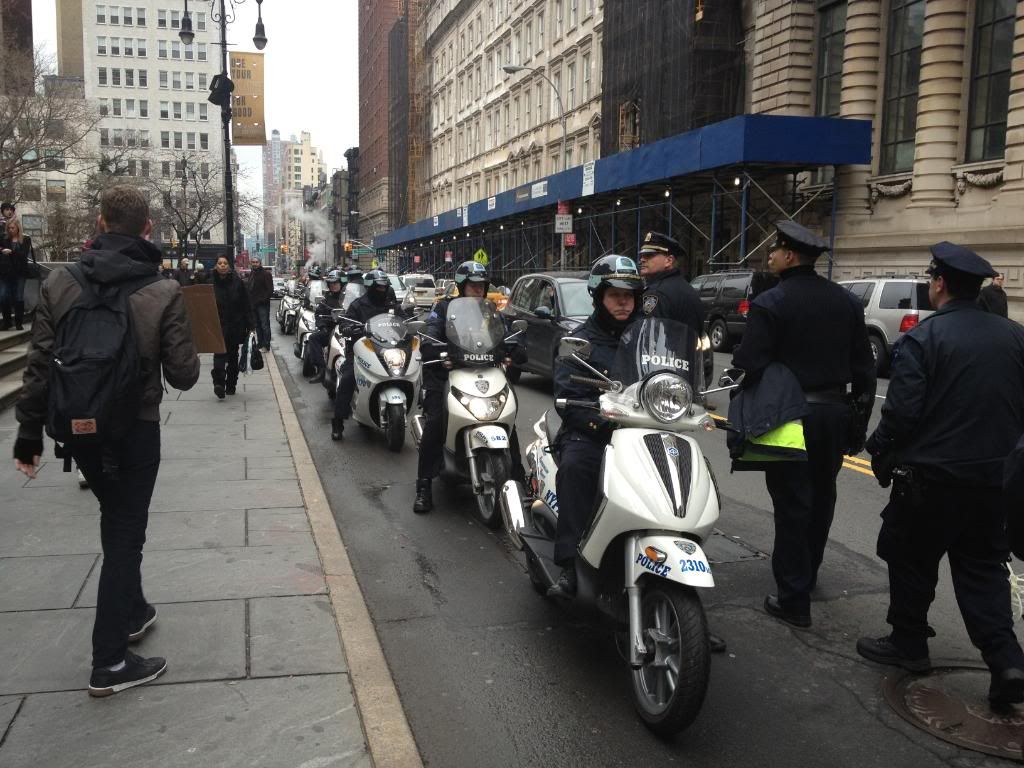 Jake, a freelancer, said he made time for the Occupy event in his work schedule because “it’s the most important thing in the world right now.”
Jake, a freelancer, said he made time for the Occupy event in his work schedule because “it’s the most important thing in the world right now.”
“Now that we’re decentralized, one of the ways we are able to stay connected is by having these big, organized, focused actions. This was an excellent opportunity for one because of the call from all around the country, so this is an action that is happening in solidarity with groups in over 30 other cities. It really builds the strength of the movement to do these unified things together.”
Four years ago, Jake says, he would have described himself as a Democrat, but now, he describes himself as disenfranchized, a common title adopted by many Occupiers.
“The fact of the matter is our matters, and our issues, don’t matter because none of our voices are being heard by either party, both of which are completely bought and sold, wholly-owned subsidiaries of corporate America and international corporations. A lot of folks here had hope in Obama in the 2008 election and were severely let down by his resulting inaction and inability to actually effect change like he promised,” he said.
What’s left, he says, is to take to the streets, protest, and physically occupy space, or as Jake put it:
“It’s too important to let this slide.”
The following day, Occupy protesters gathered once again to “Occupy education.” Actions kicked off nearby NYU when students gathered and went on a tour of various corrupt institutions, ranging from Chick-fil-A to the Daniel Straus Institute for Law and Justice.
The march was organized by NYU4OWS, a loose collective of NYU students, both graduate and undergraduate, who have come together to “fight for economic justice and social change under the banner of Occupy Wall Street,” according to the group’s website.
Daniel Jones, an undergraduate student at the Gallatin School of Individualized Study, said the protesters gathered to make clear that education is a “human right.”
“Our university needs to stop acting like a corporation and aligning itself with corporate interests. It needs to listen to the students,” said Jones.
Chick-fil-A has long been a target of NYU protest groups due to its funding of hate groups. The fast food company has donated millions to groups that have anti-gay agendas over the years.
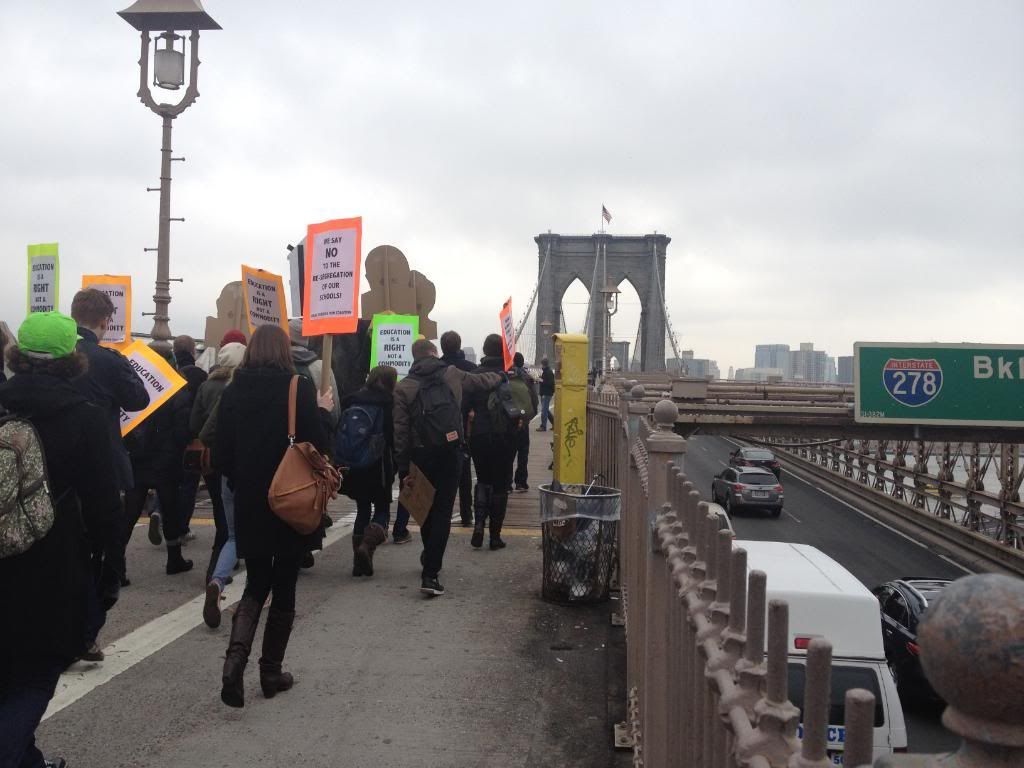 Daniel Straus, who sits on the board of director for NYU’s law school and endows the Daniel Straus Institute for Law and Justice, was included in the march because he’s locked out nursing home workers following backlash over planned slashes to employee healthcare benefits, staffing, and wages. Straus runs the Care One and HealthBridge nursing home companies along wit his brother Moshael Straus.
Daniel Straus, who sits on the board of director for NYU’s law school and endows the Daniel Straus Institute for Law and Justice, was included in the march because he’s locked out nursing home workers following backlash over planned slashes to employee healthcare benefits, staffing, and wages. Straus runs the Care One and HealthBridge nursing home companies along wit his brother Moshael Straus.
Naturally, Chase bank was also highlighted on the NYU tour.
“We’re here to tell NYU to divest from Chase because Chase has been one of the most egregious violators of the human right to housing, foreclosing on people all over New York City, especially poor and working class neighborhoods and on people of color,” said Jones.
Marchers also expressed solidarity with the Graduate Student Organizing Committee (GSOC), a group that has been fighting to get a union for teacher’s assistants and graduate students, efforts largely stymied by NYU, which threatens everything from lockouts to stripping assistants of stipends if they strike.
But above all, the message of #M1 one was a demand for affordable education.
“NYU has to stop increasing tuition, and instead of funding expansion, what they need to do is reduce the debt burden on students,” said Jones.
During the NYU march, and subsequent People’s Mic on Chambers Street before the long march across the Brooklyn Bridge, students expressed their desperation by testifying about their own personal oceans of debts.
A woman named Christie said she did “everything she was supposed to do” and now she owes $30,000 in loans.
One student on the march confessed she owes $175,000.
Ethan from Sarah Lawrence said he will owe $300,000 to the bank by the time his education is complete.
The average student loan debt is $25,000, and nationally student loans topped $1 trillion last year, surpassing credit card debt.
These huge figures used to shock me. Now, they’re typical responses because the sad truth is young people are drowning in debt.
Haley, an NYU student, calls the student debt rates “outrageous.”
“There needs to be some checks on the monopoly on education,” she said.
Short clip of students marching, approaching the Brooklyn bridge:
Caitlin MacLaren, a NYU student and organizer at Occupy Education, said that education is a right, not a privilege.
“We’re here to put student issues in the forefront and demand control of our universities,” she said, adding that the education subsets of Occupy, including Occupy the DOE, have big plans for the future.
“We’re going to plan more actions like this one, and also more targeted campaigns on our campuses. There are big movements to stop school closings…so teachers and students are organizing to stop the privatizing of K-12 education, and in our universities we’re fighting to stop tuition increases, we’re fighting to stop public debt.”




